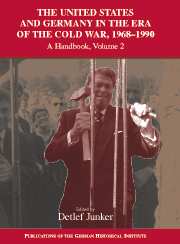Book contents
- Frontmatter
- POLITICS: Détente and Multipolarity: The Cold War and German-American Relations, 1968-1990
- SECURITY: German-American Security Relations, 1968-1990
- ECONOMICS: Cooperation, Competition, and Conflict: Economic Relations Between the United States and Germany, 1968-1990
- CULTURE: Culture as an Arena of Transatlantic Conflict
- 1 American Cultural Policy Toward Germany
- 2 The Third Pillar of Foreign Policy: West German Cultural Policy in the United States
- 3 The Study of Germany in the United States
- 4 American Studies in the Federal Republic of Germany, 1945-1990
- 5 In the Shadow of the Federal Republic: Cultural Relations Between the GDR and the United States
- 6 American Literature in Germany
- 7 The American Reception of Contemporary German Literature
- 8 The Americanization of the German Language
- 9 Between Blight and Blessing: The Influence of American Popular Culture on the Federal Republic
- 10 Popular Music in Germany: Experimentation and Emancipation from Anglo-American Models
- 11 Hollywood in Germany
- 12 New German Cinema as National Cinema
- 13 Transatlantic Reflections: German and American Television
- 14 Performance Theater in the Age of Post-Drama
- 15 Beyond Painting and Sculpture: German-American Exchange in the Visual Arts
- 16 The Rediscovery of the City and Postmodern Architecture
- 17 Modernity and Postmodernity in a Transatlantic Perspective
- 18 Confrontations with the Holocaust in the Era of the Cold War: German and American Perspectives
- SOCIETY: German-American Societal Relations in Three Dimensions, 1968-1990
- 1 “1968”: A Transatlantic Event and Its Consequences
- OUTLOOK: America, Germany, and the Atlantic Community After the Cold War
- Index
4 - American Studies in the Federal Republic of Germany, 1945-1990
Published online by Cambridge University Press: 05 January 2013
- Frontmatter
- POLITICS: Détente and Multipolarity: The Cold War and German-American Relations, 1968-1990
- SECURITY: German-American Security Relations, 1968-1990
- ECONOMICS: Cooperation, Competition, and Conflict: Economic Relations Between the United States and Germany, 1968-1990
- CULTURE: Culture as an Arena of Transatlantic Conflict
- 1 American Cultural Policy Toward Germany
- 2 The Third Pillar of Foreign Policy: West German Cultural Policy in the United States
- 3 The Study of Germany in the United States
- 4 American Studies in the Federal Republic of Germany, 1945-1990
- 5 In the Shadow of the Federal Republic: Cultural Relations Between the GDR and the United States
- 6 American Literature in Germany
- 7 The American Reception of Contemporary German Literature
- 8 The Americanization of the German Language
- 9 Between Blight and Blessing: The Influence of American Popular Culture on the Federal Republic
- 10 Popular Music in Germany: Experimentation and Emancipation from Anglo-American Models
- 11 Hollywood in Germany
- 12 New German Cinema as National Cinema
- 13 Transatlantic Reflections: German and American Television
- 14 Performance Theater in the Age of Post-Drama
- 15 Beyond Painting and Sculpture: German-American Exchange in the Visual Arts
- 16 The Rediscovery of the City and Postmodern Architecture
- 17 Modernity and Postmodernity in a Transatlantic Perspective
- 18 Confrontations with the Holocaust in the Era of the Cold War: German and American Perspectives
- SOCIETY: German-American Societal Relations in Three Dimensions, 1968-1990
- 1 “1968”: A Transatlantic Event and Its Consequences
- OUTLOOK: America, Germany, and the Atlantic Community After the Cold War
- Index
Summary
Translated by Robert Kimber and Rita Kimber
The year 1945 offered German scholarship on the United States a chance to start over. The era of anti-American propaganda, the “Aryanization” of cultural studies and the social sciences, and the expulsion of Jewish and other scholars and intellectuals from the academy was now past. The few emigrants who returned to take up permanent residence in West Germany and to teach and conduct research at West German universities played a key role in furthering scholarly discussion of American culture, society, economics, and politics. The majority of the scholars who had been forced to flee Germany, however, remained a lost resource for both West and East Germany after 1945.
Only a few West Germans in 1950 saw American culture and scholarship as a model for German reconstruction. The majority looked to pre-1933 German academic traditions. Indeed, America's “cultural independence” came as a surprise to many, for America had traditionally been regarded as an intellectual colony of Europe. The resentment of a defeated and occupied nation also came into play. Given this situation, the Amerika-Hauser established in the American zone of occupation shortly after the war ended played an important role.
The exchange programs instituted by the United States would have far-ranging consequences. In 1948, German secondary-school and university students, academics, and journalists began streaming into the United States, and at the same time hundreds of American scholars in the humanities and social sciences came to Germany as guest professors. Assisted by the program that Senator J. William Fulbright initiated in 1946, 12,824 Fulbright scholars – Germans and Americans, students and professors – crossed the Atlantic between 1952 and 1988.
- Type
- Chapter
- Information
- The United States and Germany in the Era of the Cold War, 1945–1990A Handbook, pp. 294 - 304Publisher: Cambridge University PressPrint publication year: 2004



